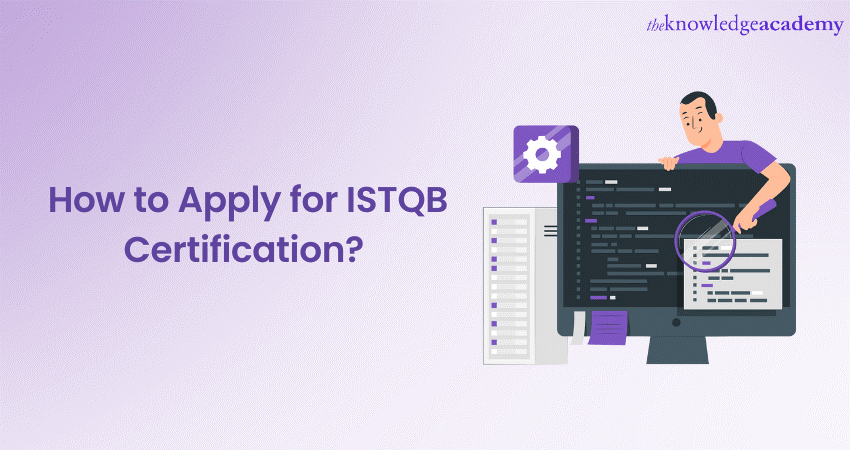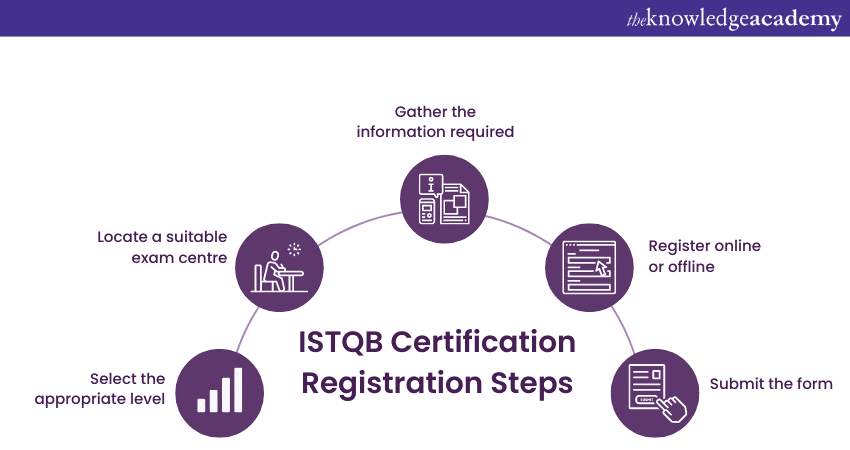We may not have the course you’re looking for. If you enquire or give us a call on 01344203999 and speak to our training experts, we may still be able to help with your training requirements.
Training Outcomes Within Your Budget!
We ensure quality, budget-alignment, and timely delivery by our expert instructors.

Are you looking to enhance your career prospects in software testing? Obtaining an International Software Testing Qualifications Board (ISTQB) certification can significantly boost your professional credentials and open doors to exciting opportunities in the field, underscoring the importance of ISTQB Certification for career growth. But a frequently asked question in relation to obtaining this qualification for aspirants is: How to Apply for ISTQB Certification?
According to the ISTQB official site, approximately 920,000 exams had been conducted worldwide as of October 2019. If you're interested in obtaining an ISTQB certification, this comprehensive guide will help you through How to Apply for ISTQB Certification. Read ahead to learn more!
Table of Contents
1) Understanding ISTQB certification
2) Registering for the ISTQB exam
3) Paying the exam fee
4) Preparing for the exam
5) Receiving the certification
6) Conclusion
Understanding ISTQB certification
Before applying for an ISTQB certification, it's crucial to understand the different certification levels offered by ISTQB. Each level corresponds to a specific stage in your software testing career and caters to varying levels of expertise. Let's explore the three main certification levels:
1) Foundation Level: The Foundation Level certification serves as the entry point into the world of ISTQB certifications. It provides a solid understanding of fundamental software testing concepts, principles, and terminology. This level is suitable for beginners or professionals with limited testing experience who want to establish a strong foundation in software testing.
2) Advanced Level: The Advanced Level certification is designed for experienced software testers who want to deepen their knowledge in specific areas of software testing. It consists of three specialised modules:
a) Test Manager: This module focuses on advanced test management topics, such as test planning, estimation, monitoring, and control. It also covers risk-based testing, metrics, and people skills necessary for effective test management.
b) Test Analyst: The Test Analyst module explores advanced testing techniques, test design, and test implementation. It delves into topics like boundary value analysis, equivalence partitioning, and state transition testing. Test Analysts are equipped with the skills to design and prioritise tests based on system requirements.
c) Technical Test Analyst: The Technical Test Analyst module addresses the technical aspects of software testing. It covers topics such as white-box testing, performance testing, security testing, and test automation. Technical Test Analysts possess the skills to assess risks related to technical components and apply appropriate testing techniques.
3) Expert Level: The Expert Level certification is the highest level of accreditation offered by ISTQB. It caters to professionals with a deep understanding of software testing and significant industry experience. The Expert Level certification consists of various modules that allow you to specialise in specific domains or areas of expertise.
Each module covers advanced topics like test automation, security testing, usability testing, and more. By achieving the Expert Level certification, you establish yourself as an authority in software testing, capable of providing valuable insights, leadership, and guidance to testing teams.
When selecting the right ISTQB certification level, consider your experience, career goals, and relevance to your work. If you're new to testing, start with the Foundation Level. For specialised roles or career advancement, pursue the Advanced Level certifications. The Expert Level is for those seeking to become industry experts. Choose a level that challenges you while aligning with your interests and aspirations. Selecting the right certification level sets the path for your growth as an ISTQB-certified professional.
Advance your software testing career with the ISTQB Advanced Software Test Analyst training course! Sign up now!
Registering for the ISTQB exam

In this section, you will be guided through how to register for the exam, ensuring a smooth and hassle-free experience.
a) Select the exam level and version: First, determine the specific ISTQB certification level and version you wish to pursue. As mentioned earlier, ISTQB offers various levels, such as Foundation, Advanced, and Expert. Each level has its own set of prerequisites and objectives. Choose the level that aligns with your skills, experience, and career goals.
b) Locate an exam centre: ISTQB exams are conducted through authorised exam centres worldwide. Visit the ISTQB official website or consult with your local ISTQB board to find the nearest authorised exam centre. Ensure that the exam centre you select offers the specific certification level and version you intend to pursue.
c) Gather required information: Gather all the information and documents before registering for the exam. Typically, you will need to provide your details, including your full name, contact information, and identification proof. Ensure you have a valid form of identification, such as a passport or driver's license, as it will be required during registration.
d) Register online or offline: ISTQB provides online and offline registration options, depending on your region and the available exam centres. If online registration is open, visit the ISTQB official website or the website of the local ISTQB board.
Follow the instructions stated to create an account and fill out the registration form. Provide complete and accurate information to avoid any issues during the process. If online registration is unavailable, contact the authorised exam centre directly to inquire about their offline registration process.
e) Submit the registration form: Complete the registration form with the required information whether you register online or offline. Double-check all the details to ensure accuracy. If any supporting documents are required, attach them as instructed.

Paying the exam fee
The exam fee stated must be fully paid to secure your spot for the ISTQB exam. Follow these steps to ensure a smooth payment process:
a) Exam Fee Confirmation: Note the exam fee amount provided during registration.
b) Payment Methods: Choose from online payment, bank transfer, or local payment options.
c) Currency Conversion and Additional Charges: Consider any currency conversion fees or additional charges that may apply.
d) Payment Confirmation: Keep the payment confirmation as proof of payment.
e) Verify Payment Status: Contact the exam centre or ISTQB if you have any concerns about the payment status.
By completing the payment process, you confirm your participation in the ISTQB exam and can focus on your exam preparation with peace of mind.
Preparing for the exam
The tips listed below will help you prepare better for the ISTQB exam:
a) Study the syllabus: Familiarise yourself with the exam syllabus and its objectives.
b) Gather study materials: Compile reliable study materials aligned with the syllabus.
c) Create a study plan: Organise your study sessions and allocate dedicated time.
d) Practice with sample exams: Take practice exams to familiarise yourself with the question format and improve time management.
e) Join study forums: Engage with fellow candidates, ask questions, and share knowledge.
f) Consider training courses: Attend authorised training courses to gain structured learning and practical insights.
g) Review and revise: Regularly review the material, focusing on weaker areas and creating summary notes or flashcards.
h) Manage exam stress: Practice stress management techniques and maintain a healthy lifestyle.
i) Exam day preparation: Arrive early with necessary documents, read questions carefully, and stay confident.
Propel your software testing automation career forward with the ISTQB Advanced Test Automation Engineer training course!
Receiving the certification
After completing the ISTQB exam, follow these steps to receive your certification:
a) Result notification: You will receive a notification of your exam results via email or SMS, indicating whether you passed or failed.
b) Certificate issuance: If you pass the exam, you will be eligible to receive your official ISTQB certification.
c) Certificate delivery: The certificate may be available for download or mailed to your registered address.
d) Add to your profile: Update your professional profiles to showcase your ISTQB certification. Stay updated on CPD requirements to maintain the validity of your certification.
Conclusion
Achieving an ISTQB certification is a significant milestone in your software testing career. By following the step-by-step registration process outlined in this blog, you can navigate the certification journey and learn How to Apply for ISTQB Certification. Remember to research the certification levels thoroughly, prepare diligently, and take advantage of authorised training providers to maximise your chances of success.
Obtaining an ISTQB certification will validate your skills and open up new avenues for professional growth and advancement. Take the first step today and embark on your path to becoming an ISTQB-certified professional.
Take your software testing skills to the next level with the ISTQB Software Testing Foundation course now!
Frequently Asked Questions
Upcoming Business Analysis Resources Batches & Dates
Date
 ISTQB Software Testing Foundation
ISTQB Software Testing Foundation
Mon 20th May 2024
Mon 3rd Jun 2024
Mon 17th Jun 2024
Mon 1st Jul 2024
Mon 29th Jul 2024
Mon 12th Aug 2024
Tue 27th Aug 2024
Mon 9th Sep 2024
Mon 23rd Sep 2024
Mon 7th Oct 2024
Mon 21st Oct 2024
Mon 4th Nov 2024
Mon 18th Nov 2024
Mon 2nd Dec 2024
Mon 16th Dec 2024
Mon 6th Jan 2025
Mon 20th Jan 2025
Mon 3rd Feb 2025
Mon 17th Feb 2025
Mon 3rd Mar 2025
Mon 17th Mar 2025
Mon 31st Mar 2025
Mon 28th Apr 2025
Mon 19th May 2025
Mon 2nd Jun 2025
Mon 16th Jun 2025
Mon 30th Jun 2025
Mon 14th Jul 2025
Mon 28th Jul 2025
Mon 11th Aug 2025
Mon 8th Sep 2025
Mon 22nd Sep 2025
Mon 6th Oct 2025
Mon 20th Oct 2025
Mon 3rd Nov 2025
Mon 17th Nov 2025
Mon 1st Dec 2025
Mon 15th Dec 2025







 Top Rated Course
Top Rated Course


 If you wish to make any changes to your course, please
If you wish to make any changes to your course, please


